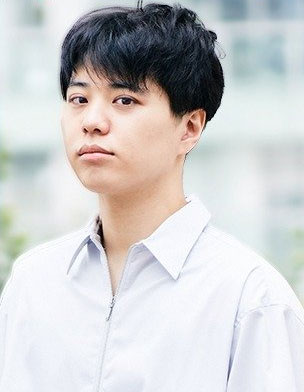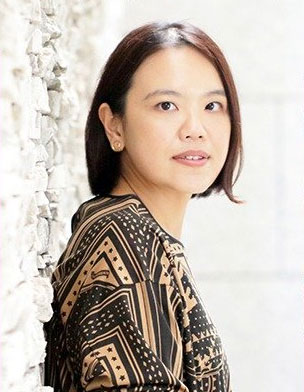Topics
One-on-One Talk
2022.07.12
We can form connections because we don’t know what others are feeling. That unknown drives us to connect.
Kanata Kimijima & Mizuki Tsujimura’s One-on-One Talk Commemorating the Publication of Can’t Cry With Your Face
Kanata Kimijima Photo by Ryuji Hashimoto
Mizuki Tsujimura Photo by Sodo Kawaguchi
“Can’t Cry With Your Face” Kanata Kimijima
“YAMIHARA” Mizuki Tsujimura
“There’s someone I meet just once a year. Someone my husband doesn’t know.”
Can’t Cry With Your Face, which begins with a mysteriously intriguing line, is Kanata Kimijima’s debut novel. It was awarded the 12th Shosetsu Yasei Jidai Rookie of the Year Award. The supplementary band on the dust jacket includes an excerpt from judge Mizuki Tsujimura’s commentary: “The moment I finished reading it, I made it my mission to advocate hard for it at the judging session.” What spoke so deeply to her soul to make her feel that way?
Mizuki and Kanata met for the first time through a computer screen to discuss Kimijima’s award-winning novel.
I thought, “This is it!” after reading just the first dozen pages.
Mizuki Tsujimura: Kanata, it’s nice to meet you. Congratulations on the award!
Kanata Kimijima: Thank you. When my editor contacted me about the award, they mentioned that you really advocated for it. I’ve been wanting to thank you ever since.
Mizuki: I didn’t know you found out so early on that I was rooting for your novel. [laughs]
Kanata: I did. [laughs] After that I read your judge commentary, and I thought, “She really rooted hard for me!” I was touched.
Mizuki: There were three novels that made it to the final round this year, and I just so happened to read yours last. For that reason, my guard was up before I even started reading your work. I kept my thoughts regarding the two other novels in the back of my mind as I skipped a bit ahead in your novel, trying to figure out the genre and the theme of the story. That is why when I started to read it, I thought, “Gotcha, it’s an affair story.” I thought it was a story about a contrarian type of girl who’s like “Having affairs behind my husband’s back is a piece of cake for me.” [laughs] But then she comes across a boy who appears to be an old classmate from her hometown, and the more they talk, the more each of them starts using language the other gender would use until it reaches a point where you no longer know who's the one talking. Right when you start to realize something’s off, the last paragraph of the first section appears.
“15 years ago, our bodies swapped. And in those 15 years up until this day, not even once have we gone back.”
When I encountered that one sentence, my heart danced and I thought, “This is it!” After all, your novel was able to flip the reader’s assumption on its head in just the first ten or so pages. From that point onwards, I was beyond excited to go find out what kind of lives these two had led during that time.
Kanata: I was intentionally trying to trick the reader in the beginning, so hearing you say that is a win for me. [laughs]
Mizuki: Which is why, honestly speaking, I’d like for readers to go into it blind. And yet I’m over here spoiling it right away for everyone, so I’m sorry about that. [laughs]
Kanata: Readers would have to know, or else they’d be like “What’s this story even about?” So, no worries! [laughs]
Mizuki: A lot of novels start in the present and then go into the past, frequently switching back and forth between the past and the present. But if you had written the plot twist at the beginning of the story thinking it would lure the reader in, I don’t think I would have been this captivated. I think as the author you chose a starting point that you felt would present the story in the most interesting way. Was that something you had in mind?
Kanata: To tell you the truth, this was originally a short novel. I only wrote about when they were 30 years old, and how 15 years after the event that caused them to swap bodies happened, Riku and Manami meet again in their hometown and talk about their recent lives as well as the past. However, an acquaintance who took the time to read the story said to me, “Wouldn’t it be more interesting if you expanded on the story a bit more?” That led me to think up the events that occurred during those 15 years, from when they were freshmen in high school to the present. Then I added their past into the novel.
Mizuki: I felt that there were a lot of good points in the part of the story about their past, and because of this, your story became a full-length novel and you were able to enter it into this contest. You absolutely made the right call. Please treasure that acquaintance of yours. [laughs]
Writing their relationship as comrades; not romantic partners
Mizuki: Speaking of stories in which a girl swaps bodies with a boy, there's the novel I’m Her and She’s Me by Hisashi Yamanaka, and more recently the animated film Your Name directed by Makoto Shinkai. Why did you decide to write this story in the first place?
Kanata: Makoto Shinkai’s Your Name was indeed part of the reason why. It wasn’t exactly a direct influence, but when I saw the film, I was reminded of the fact that these types of stories have existed ever since the Heian period (794 to 1185) when the novel The Changelings was written. I realized that this is one of the universal forms of storytelling told throughout the ages. That’s why I wanted to try and write something that went one step further than all of the other stories that have already been told. First, I decided that they would never return to their original bodies ever again. I wanted to depict in profound detail how the two would face their new reality seriously and the struggles they would face as a result, like not being able to meet their family and friends. Also, when it comes to body-swapping stories involving a boy and a girl, the two usually evolve into a romantic relationship. So, another thing I had decided was that Riku and Manami would never get romantically involved.
Mizuki: The fact that they don’t develop a romantic relationship was well received not only by me, but also by my fellow judges Tomihiko Morimi and Tow Ubukata. Tow said, “It would have been like falling in love with a mirror” and I thought he made a good point.
Kanata: I’ve always wondered how realistic it is for two people who swap bodies to fall in love with somebody that used to be them. I also felt that if I bring romance into the mix, the relationship between the two wouldn’t hold the same meaning. That’s why I wanted to depict them as comrades that fight through their struggles together and share a secret they can't tell anyone else.
Mizuki: I feel you have an innate talent for creating stories since you instinctively know exactly what parts you should write and what parts you don’t need to. Also, if there’s anything unnatural about the way each gender is depicted in these types of boy-girl body-swapping stories, it often ends up ruining the entire novel. But to tell you the truth, I assumed the author was a woman right up until the judging session. That’s how natural the feminine expressions were. The day before the session I received your profile and found out that you were actually a man. That made me realize you’re the type of person who selects their words carefully with genuine consideration for how those in your story would act and feel, and my trust in you skyrocketed instantly. For example, your novel is told through the perspective of Riku, the boy who swaps bodies with Manami, a girl in his class. The day the swap occurs, she’s on her period. It’s not like Riku is a particularly naive or sensitive boy, but he’s overwhelmed by the changes in his body and he ends up crumbling down in front of the bathroom and crying. Manami’s mother becomes concerned and gently asks him, “Will you be okay going to school today?” You included what he was feeling physically and wrote out that entire chain of events with great care.
Kanata: Thank you. I wrote how it might feel like for a man to be in a woman’s body based entirely off of my imagination, so to receive a compliment from you, a female author, is truly the highest praise I could receive.
Mizuki: We’d be here forever if I mentioned all the small details, but truly, everything’s written just so carefully. Like the scene in which he has his first sexual experience. All three of us praised that scene.
Kanata: For events that may occur in a woman’s life, which are possible turning points, I felt it was necessary to write them out in great detail. If I only wrote, “They spent the night together” and that was it, I felt it would be a cop-out.
Mizuki: Wonderful!
Why only one point of view was featured instead of intertwining their two perspectives
Mizuki: What’s truly great throughout your novel is that by utilizing the fact that a boy and girl swapped bodies, it helps us as the reader realize that we’ve been living our lives without giving any special thought to so many things that we experience. This unique phenomenon that occurs in your story changes every minor event into a big deal, which makes us aware of those same events in our own lives as well. But in reality, the things that happen are nothing out of the ordinary. Like falling in love with someone of the opposite gender or having a falling out with your best friend.
Kanata: As you say, the things that happen are ordinary events probably experienced by everyone. However, since these two swapped genders, even the ordinary becomes unordinary. Their perspective changes and the way they experience events changes. That’s something I really wanted to make sure I wrote in detail.
Mizuki: The way you wrote about their families really got me. Riku and Manami are forced to see their homes through the perspective of another person. Since we don’t get to choose what kind of environment we’re born into, I think it’s quite hard for us to objectively analyze what kind of people our parents are and what kind of home we grew up in, because that’s our standard of normal. But thrown into a situation like this you’d gain objectivity, and the way you depicted their emotions that arose because of it was truly convincing.
Kanata: Things that may be common sense to someone that’s lived in their home all of their life might be something that someone else might look at and say, “Huh, what are you saying? We don’t do that in my household.” I think that happens quite a lot. For example, in my household, we drink Yakult every morning and night without fail.
Mizuki: Wow! [laughs]
Kanata: I mentioned this to someone and they said something along the lines of “That’s rare. I guess you guys are pretty health conscious to be drinking Yakult.” That made me realize it might not be something most families do. Maybe this wasn’t the best example. [laughs] Regardless, even things that are common sense in your family might be something that others consider - not necessarily absurd, but perhaps, a bit strange. I think that’s an experience many people could relate to. So, I thought it might be interesting to use a body-swapping situation between a boy and girl at an age where they feel things so intensely and use that as the base to expand the story.
Mizuki: It really was interesting. Also, because of the fact that we see these interactions in the first half, that one critical event that occurs towards the end really delivers a heavy impact. Just thinking about that scene now is giving me all the feels again. [laughs]
Kanata: I’m really feeling your love for my novel and it’s making me extremely happy right now.
Mizuki: Can I ramble on a bit more? [laughs] The way you depicted Manami in Riku’s body was amazing as well. Manami must be having her own struggles but she doesn’t mention any of it, and instead she provides support to Riku who’s in a constant dilemma. Manami starts receiving more and more attention from girls and at a very early stage begins thinking about accepting her new life in a different body. I thought maybe you wrote her that way because you have faith that women are innately tough. At the same time, I felt that the reader is able to feel Manami’s strength so clearly because of the fact that you didn’t write from her perspective. When a writer decides on the theme you chose for their novel, I think the majority would probably take turns writing both the male and female perspectives. However, you didn’t do that.
Kanata: Right. I decided beforehand that I’d only write from Riku’s point of view. Riku doesn’t know what Manami is feeling on her side of things when they experience each one of those events. But it’s the same in our daily lives too. There’s no way of knowing what someone else is feeling. I know my novel is fiction, but regardless I felt that if Riku knew Manami’s feelings then the story would become uninteresting and the meaning of the connection between Riku and Manami would slightly change. I wanted to leave Riku and the readers in the dark. I think it’s the “not knowing” that can create the space for us to form a connection.
Mizuki: I agree completely. We can’t truly know how another person is feeling, but that’s exactly why we can form a connection with them. It’s what drives us to connect.
The depth of the reality gives the novel a universal appeal
Mizuki: I think the reason there are already so many body-swapping stories depicted in TV, film, and manga is because it’s so visually entertaining. However, your novel brings forward a layer that can only be shown through writing. I think Riku and Manami’s emotions come through to us with such a grounded reality because this is a novel. But some readers might think, “Oh come on, they should be desperately trying to return to their own bodies.” That’s not really something that bothered me as I read on because it was indicated pretty early on that the two had somewhat resigned themselves to their fate and accepted their new life. But another judge did comment on that.
Kanata: As you just mentioned, I wanted to write about what the two would feel and how they would live their lives from that point onwards in a realistic manner. I didn’t place as much importance on why their bodies swapped or how their situation could be solved. Honestly, I didn’t give it much thought. So, when I read Tomihiko’s commentary, I agreed. If I had incorporated those elements into my story better, they would have added more literary depth. It made me realize that I don’t yet have the skill set required to incorporate all of that in a satisfying way. On the other hand, that’s something that you’re wonderful at.
Mizuki: Why thank you! That makes me happy.
Kanata: For example, in Lonely Castle in the Mirror, a group of children who have stopped going to school are summoned to a world that lies beyond a mirror, giving it an element of fantasy. There’s a ton of detail about the background of each of the characters and what they’re feeling, while the story also neatly unravels the mystery of that world and why the children were gathered there to begin with. The drama of the children’s inner turmoil and the fantasy-like mystery are blended together perfectly. I hope to be able to write a novel like that one day.
Mizuki: I’m looking forward to that! But I think for your novel, what you chose was the best story structure that it could have. There is a unique setting, but even without it, the depth of realism that lies beyond that makes the novel universally entertaining. I’m sure it’ll be read by a wide range of people. I think this literary style will become a great weapon in your arsenal as a writer. This time you depicted the realities of both the boy and the girl, and I’m already excited to see what kind of story your second novel will feature.
Kanata: I’ll keep your words close to my heart!
Writing & Editing by: Daisuke Yoshida
Original post
https://kadobun.jp/feature/talks/6r6skle5hvk0.html
https://kadobun.jp/feature/talks/6r6skle5hvk0.html








